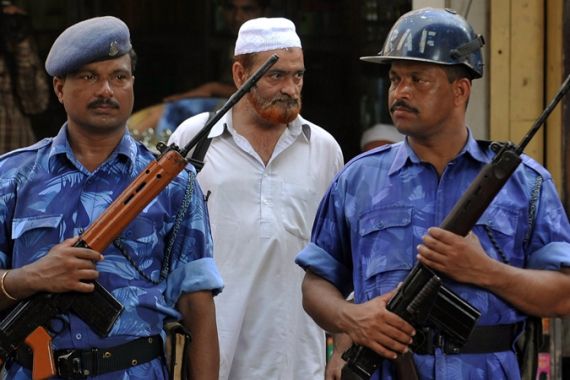Indian court divides holy site
Site in Ayodhya is to be split between three religious groups, but Muslims and Hindus plan to appeal decision.

A disputed Indian holy site in the ancient city of Ayodhya claimed by both Muslims and Hindus is to be divided among three religious groups, a court has ordered on Thursday.
The Lucknow bench of the Allahabad High Court issued the much anticipated order on Thursday. Each of the three judges in the case – SU Khan, Sudhir Agarwal, and DV Sharma – issued their own summary of the judgement.
The judges gave control of the main disputed section of the site, where a mosque was torn down in 1992, to Hindus. Other parts of the site will be controlled by Muslims and another Hindu sect.
Officials urged all communities to remain calm and respect the high court’s verdict.
The Associated Press news agency quoted a lawyer for the Muslim community as saying he would appeal the ruling. A final decision could take years to emerge.
‘Partly disappointed’
The main Muslim group contesting the religious site said it was “partly disappointed” by the verdict.
“The suit of Muslims were liable to be dismissed. But they are still entitled to one third of the site,” Zafaryab Jilani, the lawyer for the Babri Masjid Action Committee, told reporters.
“We can say we are partly disappointed not fully because some of the stand of the Muslims has been vindicated.”
HS Jain, one of the Hindu plaintiffs, also said he would appeal against the court’s ruling because “100 per cent of the land belongs to Hindus. Why split it?”
Authorities in India tightened security across the country in advance of the ruling, with the police arresting more than 7,000 people as a preventive measure.
“Security measures have been enormous,” Al Jazeera’s Divya Gopalan reported from Lucknow.
“In the financial city of Mumbai we have seen over 10,000 policemen on the streets. So far we haven’t heard of any unrest yet,” she said.
The demolition of the mosque in the 1990s led to one of the country’s worst riots since independence.
India’s supreme court cleared the way on Tuesday for the lower court to decide on the ownership of the site, over which Hindus and Muslims have quarrelled for centuries.
Hindu groups say the mosque stood on the birthplace of their god-king Rama and was built only after the destruction of a longstanding Hindu temple by Muslim invaders in the 16th century.
‘Significant step’
L.K. Advani, senior leader of the main opposition Bharatiya Janata Party (BJP) whose drive to build a temple in Ayodhya catapulted the movement to political centrestage, hailed the court decision.
The verdict “is a significant step towards building of a grand temple,” Advani said.
The dispute over the site flared up in 1992 after a Hindu mob destroyed the mosque and nearly 2,000 were killed in rioting between Hindus and Muslims across the country.
Manmohan Singh, India’s prime minister, has described the 60-year-old Babri mosque-Ram temple case as one of the biggest security challenges in India – in addition to the Maoist campaign and the Kashmiri separatist uprising.
But on Thursday he said that he was confident that the decision would bring the country together rather cause any further unrest.
“I have full faith in the people of India and I also have full confidence in the traditions of secularism, brotherhood and tolerance of our great country,” Singh said.
“I know that often it is only a few mischief makers who create divisions in our society. I would appeal to my countrymen to be vigilant and not let such people succeed in disrupting peace.”
SHS Khandwawala, Gujarat’s police chief, said more than 70,000 security personnel have been deployed to ensure there is no violence in the state of Gujarat which witnessed nearly 2,000 deaths in 2002 violence between Hindus and Muslims.